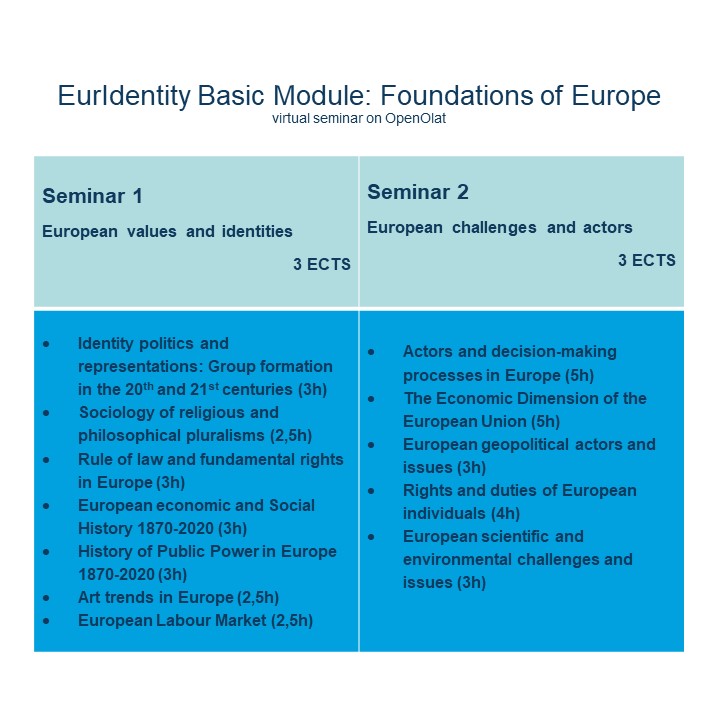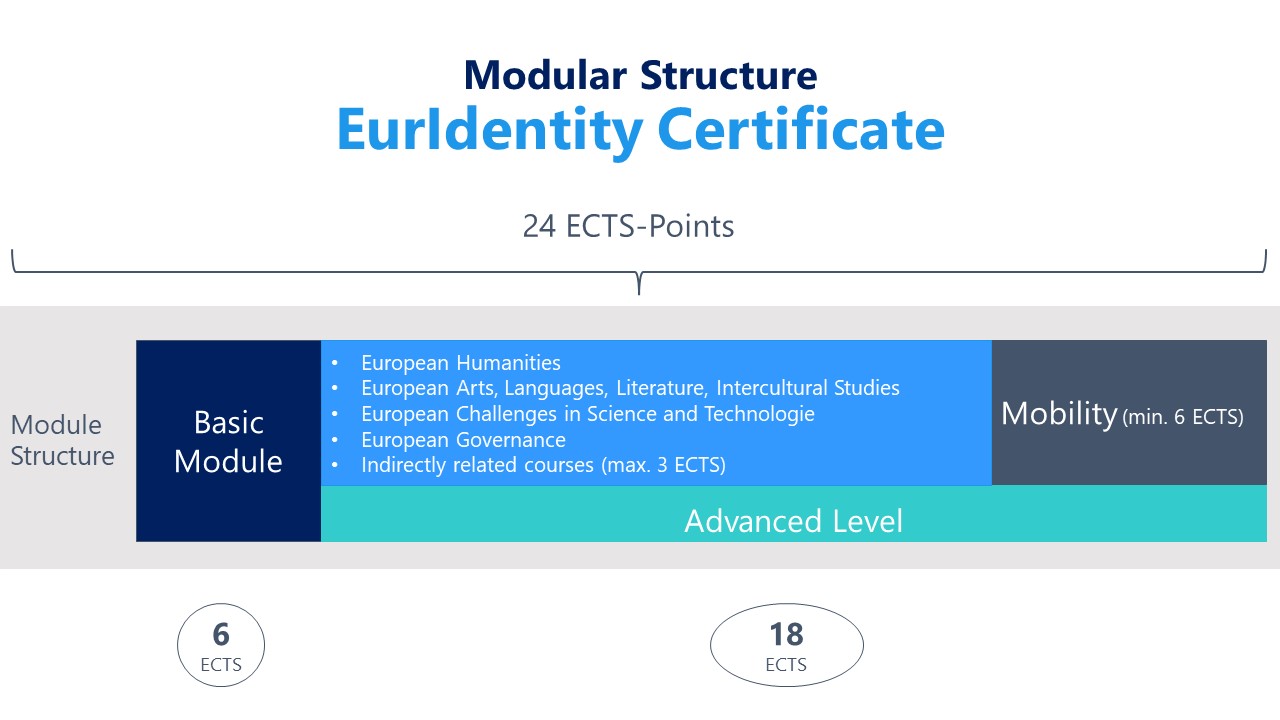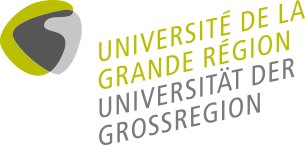
If you're looking to strengthen your knowledge about Europe and develop your intercultural skills, the EurIdentity Certificate programme is for you.
The EurIdentity Certificate is an additional qualification open to all students of the UniGR network University of the Greater Region, no matter which academic discipline they are studying. The certificate programme enables students to acquire a general understanding of Europe and improve their intercultural competence.
The EurIdentity Certificate is offered by the following universities within the UniGR network:
- RPTU Kaiserslautern-Landau
- Université de Liège
- Université de Lorraine
- University of Luxembourg
- Saarland University
- Trier University
- htw saar
The certificate consists of two modules:
- Basic Module (6 ECTS)
- Advanced Level (18 ECTS)
The basic module consists of online courses covering a selection of European topics and an optional block seminar. The online courses can be viewed at any time via the web-based learning platform OpenOLAT.
Students who complete the advanced level gain deeper insight into European topics and the opportunity to acquire the official EurIdentity Certificate. The advanced module not only tests and deepens students’ understanding of Europe in seminars, it also enables them to enhance their intercultural skills through cross-border mobility and the opportunity to study at a partner university in the UniGR network.
EurIdentity Basic Module: Fondations of Europe
EurIdentity Basic Module: Fondations of Europe
The EurIdentity Basic Module 'Foundations of Europe' (6 ECTS credits*) consists of 12 online sessions that teach students fundamental aspects of core European issues. These online lessons can be viewed at any time and any number of times via the OpenOLAT platform.
With a total running time of 40 hours, the 12 sessions cover aspects of European culture, European law, European history, the EU and climate change, the European labour market and European politics.
What makes the module format so special is the choice of lecturers. All 12 sessions will be delivered in English by different experts from the seven UniGR partner universities.
Optionally, EurIdentity Certificate offers students who have registered for the Basic Module the opportunity to visit a European institution as part of a day trip. The specific dates will be announced as soon as possible.
*5 ECTS at the Trier University
EurIdentity Advanced Level
EurIdentity Advanced Level:
The EurIdentity Certificate Advanced Level is an additional qualification that accompanies a course of study and provides an in-depth insight into European topics.
Students complete a total of 24 ECTS (25 ECTS at the University Trier). The completion of the EurIdentity Basic Module "Foundations of Europe" and an international mobility are obligatory.
Students can select various courses from the course catalogs of the UniGR partner universities, taking into account their individual interests, and thus qualify for the international, cross-border job market.
Formal requirements:
- A total of 24 ECTS (25 ECTS at the University Trier)
- Successful completion of the EurIdenity Basic Modules: Foundations of Europe (6 ECTS (5ECTS at the University Trier)).
- Mobility at a foreign European university (also possible online)
- Language: English, German and French depending on selected course
Course topics:
Students choose courses from the following areas/topics (one or more thematic areas can be selected):
- European Humanities
- European arts, European languages, European literature and intercultural studies
- European challenges in science and technology
- European governance and European politics
- Courses indirectly related to Europe (a maximum of 3 ECTS can be chosen from this division).

International Mobility:
In addition to specialized knowledge in European thematic areas, students gain complementary practical experience in cross-border exchanges with universities in the UniGR network or another European university. The mobility can be virtual or present and must comprise at least 6 ECTS.
The chosen courses must be agreed upon in advance with the study coordination in a learning agreement and must fit the contents of the certificate. They then replace regular module elements within the certificate.
Course Catalog:
Through UniGR student status, students can take courses at all UniGR partner universities. This provides students with a wide variety of course choices. Please see the following links for the corresponding course catalog of each UniGR partner university:
Your Benefits
► Expand and develop your intercultural skills
► Deepen your understanding of Europe and European issues
► Improve your foreign language skills (French, German, English)
► Increase your chances of recruitment on the European labour market
► Take a course outside of your home country and discover what it's like to learn in an international context
► The EurIdentity Certificate will be awarded to students who successfully complete both modules

The Project "UniGR-EurIdentity Certificate"
It is becoming increasingly apparent that public discourse on political and social issues in Europe and its nations is changing. It is therefore all the more important that we foster contact between different European cultures and provide access to fundamental knowledge about Europe.
To address this challenge, a consortium of seven universities (htw saar, RPTU Kaiserslautern-Landau, University of Lorraine, University of Luxembourg, Saarland University, Trier University, University of Liège) – all partners within the within the University of the Greater Region (UniGR) – have collaborated to create a certificate programme that focuses on core European values (human dignity, freedom, democracy, equality, the rule of law and respect for human rights as mentioned in Article 2 of the Treaty on European Union) and knowledge about the European Union (its institutions, politics, history, culture, law, etc.). Funding for the EurIdentity Certificate project has been provided by the European Commission via the Erasmus+ programme.
Promoting education on the EU, its institutions, its history and values: The EurIdentity Certificate aims to educate the citizens of tomorrow’s Europe so that they are equipped to face the political and societal challenges of their generation and can help to promote the European spirit.
Europe for all: The programme explicitly includes students from disciplines not usually associated with questions about Europe.
Mobility: The programme fosters cross-border mobility in the Greater Region and benefits from the fact that the seven partner institutions are located in relatively close proximity to each other.
Employability: Students who acquire the EurIdentity Certificate have the skills and competencies needed in the cross-border labour market (240,000 cross-border employees in the Greater Region).
Learning: The structure and curriculum of the EurIdentity Certificate programme is being developed jointly by all partners and takes into account new trends in educational methodologies, such as virtual mobility, blended learning, etc.
The EurIdentity Certificate project is also aligned with Vision 2040 of the Greater Region. Vision 2040 envisages an educational system in which higher education institutions play a leading role in disseminating knowledge about Europe and promoting intercultural competence.
Partners: TU Kaiserslautern, Université de Lorraine, Université du Luxembourg, Universität des Saarlandes, Universität Trier, Université de Liège, htw saar, Université de la Grande Région (UniGR)
Start date: September 2020
End date: August 2023
Budget: €289,000
More Informationen: Victoria Petri, Advisor on cross-border projects, University of the Greater Region.
Further Details: Project description

Contacts and Enrolment Information
University of the Greater Region - Central Office:
Coordination EurIdentity Certificate:
Victoria Petri, Advisor for Cross-Border projects; University of the Greater Region
;
T. +49 (0) 681 301 40803
Rheinland-Pfälzische Technische Universität Kaiserslautern-Landau:
Coordination EurIdentity Certificate:
Laura Lombardi
T. +49 (0) 631 205 5181
Sophia Dorka, UniGR-Officer
;
T. +49 (0) 631 205 4353
For more information about the EurIdentity Certificate at RPTU Kaiserslautern-Landau.
University of Liège:
Coordination EurIdentity Certificate:
Florence Hautekeer, UniGR-Officer
;
T. +32 (0)43 669 713 or +32 (0)43 665 723
Université de Lorraine:
Coordination EurIdentity Certificate:
Alexis Polus, UniGR-Referent
For more information about the EurIdentity Certificate at Université de Lorraine.
University of Luxembourg:
Coordination EurIdentity Certificate:
Mareike Wagner, UniGR-Officer
; T. +352 46 66 44 9676
Saarland University:
Coordination EurIdentity Certificate:
Eva-Maria Hengsbach, UniGR-Officer
;
T. +49 (0) 681 302 3891
Contact Europaicum:
Elisabeth Marx, CEUS Cluster für Europaforschung;
;
T. +49 (0) 681 302 70438
For more information about the EurIdentity Certificate at Saarland University.
Trier University:
Coordination EurIdentity Certificate:
Dr. Sandra Kraft
For more information about the EurIdentity Certificate at Trier University.
University of Applied Sciences in Saarbrücken:
Coordination EurIdentity Certificate:
Malika Picart; UniGR-Officer
;
T. +49 (0) 681 5867 99 099
For more information about the EurIdentity Certificate at htw saar.


